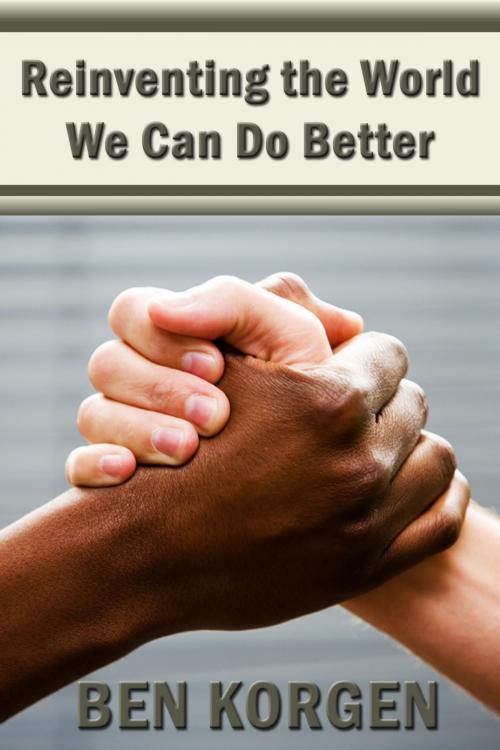Reinventing The World, We Can Do Better
Nonfiction, Religion & Spirituality, Philosophy, Political, Ethics & Moral Philosophy| Author: | Ben Korgen | ISBN: | 9781622879823 |
| Publisher: | First Edition Design Publishing | Publication: | August 25, 2015 |
| Imprint: | First Edition Design Publishing | Language: | English |
| Author: | Ben Korgen |
| ISBN: | 9781622879823 |
| Publisher: | First Edition Design Publishing |
| Publication: | August 25, 2015 |
| Imprint: | First Edition Design Publishing |
| Language: | English |
The purpose of this book is to provide background information needed to start and wisely participate in a worldwide conversation that could lead to a happier and less confrontational world. It does this by defining history recycling leadership and suggesting methods of releasing ourselves from its grip. It defines history-recycling leadership as a process of social influence which maximizes the efforts of others but unintentionally spawns continuing cycles of prosperity, poverty, tranquility and violence. It recognizes that to escape from history-recycling leadership, humans will need fresh ideas. To get these ideas, they need to avoid depending on leaders who minimize the random popping of ideas into their heads to project their images as stable, solid citizens who can govern the ship of state with a steady hand on the helm. To get the ideas they need, humans also should avoid electing idea people to lead them because idea people usually do not make good leaders. Their most valuable thoughts pop into their heads at random in ways that prospective voters perceive as erratic and undesirable in leadership positions. For making progress in this direction, this book recognizes that we already have a working model to emulate. Science, engineering and technology have long histories of racing forward with little or no recycled effort. They have accomplished this driven by leaders who realize that maintaining the forward momentum of their efforts depends on accepting the inputs of idea people. This book recognizes that escaping from history-recycling leadership is not possible if leaders merely accept ideas from a limited number of idea people for at least two reasons. First, leaders depending on a random popping up of ideas in the minds of a small number of people may get ragged inputs of good, bad, relevant or irrelevant ideas on days when the best ideas in the world may be floating around somewhere in a distant country. Second, history-recycling leadership affects the lives of everyone in the world, suggesting defeating it will require the fruits of a worldwide effort. This book addresses needs for a worldwide effort by offering a sample path for testing, adopting or discarding for something better. This path includes methods of world-scale recruitment of idea people, harvesting ideas, filtering them to winnow out the most promising ones and debating their value before worldwide referendums for approval and implementation. The chapter titles of this book are Introduction, Confucius, Joan of Arc, Booker T. Washington, Fridtjof Nansen, Albert Einstein, Einstein's Letter, Adolph Hitler, Alister Hardy, Genetics, Multiple Intelligences, Gender, Personality, Temperament, Decision Chains, Leadership, Science, Thinking, Brainstorming, Energy, Population, Institutions, Politics, Atonement, Strawman Triggers, Influences and References.
The purpose of this book is to provide background information needed to start and wisely participate in a worldwide conversation that could lead to a happier and less confrontational world. It does this by defining history recycling leadership and suggesting methods of releasing ourselves from its grip. It defines history-recycling leadership as a process of social influence which maximizes the efforts of others but unintentionally spawns continuing cycles of prosperity, poverty, tranquility and violence. It recognizes that to escape from history-recycling leadership, humans will need fresh ideas. To get these ideas, they need to avoid depending on leaders who minimize the random popping of ideas into their heads to project their images as stable, solid citizens who can govern the ship of state with a steady hand on the helm. To get the ideas they need, humans also should avoid electing idea people to lead them because idea people usually do not make good leaders. Their most valuable thoughts pop into their heads at random in ways that prospective voters perceive as erratic and undesirable in leadership positions. For making progress in this direction, this book recognizes that we already have a working model to emulate. Science, engineering and technology have long histories of racing forward with little or no recycled effort. They have accomplished this driven by leaders who realize that maintaining the forward momentum of their efforts depends on accepting the inputs of idea people. This book recognizes that escaping from history-recycling leadership is not possible if leaders merely accept ideas from a limited number of idea people for at least two reasons. First, leaders depending on a random popping up of ideas in the minds of a small number of people may get ragged inputs of good, bad, relevant or irrelevant ideas on days when the best ideas in the world may be floating around somewhere in a distant country. Second, history-recycling leadership affects the lives of everyone in the world, suggesting defeating it will require the fruits of a worldwide effort. This book addresses needs for a worldwide effort by offering a sample path for testing, adopting or discarding for something better. This path includes methods of world-scale recruitment of idea people, harvesting ideas, filtering them to winnow out the most promising ones and debating their value before worldwide referendums for approval and implementation. The chapter titles of this book are Introduction, Confucius, Joan of Arc, Booker T. Washington, Fridtjof Nansen, Albert Einstein, Einstein's Letter, Adolph Hitler, Alister Hardy, Genetics, Multiple Intelligences, Gender, Personality, Temperament, Decision Chains, Leadership, Science, Thinking, Brainstorming, Energy, Population, Institutions, Politics, Atonement, Strawman Triggers, Influences and References.















